We can’t do life alone. There’s just no way. We all need one another. We’re all mirrors of each other. The universe is uni (one), verse (song), and we all make music through the lives we lead.
Want to create a symphony? Then use your creative mind, and with other people in mind, build a business that helps and serves. Create something of tangible value.
People pay a lot of money for value.
And people will want to know how you did it. That’s your story.
Everyone has a story.
I am Mark Brodinsky and this is Mark Brodinsky You Matter Storytelling.
___________________________________________________
Mark Brodinsky You Matter Storytelling: Other People Matter
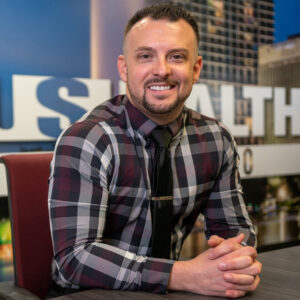
“You just can’t beat the person who never gives up.” – Babe Ruth
There’s nothing wrong with taking advice from the Sultan of Swing: Never give up.
For a time, Ronald Wysocky thought he might be a professional baseball player. It’s a sport he loves and it taught him a lot about life, since the sport itself is immersed in finding success amidst massive failure. It’s not easy to make it to “The Show.” But his baseball experience gave Ron the on-the-field and off-the-field advantage he uses to be a successful sales leader at USHEALTH Advisors.
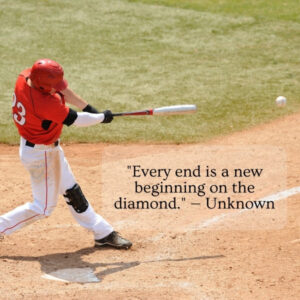
“The baseball thing is huge,” says Ron. “When I look for people, it’s part of my interview question to say, “Did you play sports?” There’s a certain level of discipline you have to have in this. And if you played college sports, it’s probably one of two things. You knew what it took to work with a team, and hold yourself to a certain level of accountability. You’re not just an individual on a team, you’re part of the entire team and people are watching you. So if you’re someone that’s really good in high school, if you went on and played college ball, you’re probably the best player on your high school team. People look up to you, so how you carry yourself and what you say is very important. Baseball always taught me a lot about all that and about work ethic.”
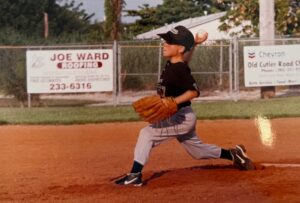
“You also work hard when you play sports, college sports in particular, and you have different coaches. And I always say, the bigger the a-hole, the kind of better it is. You need to have that type of coach that’s going to tell you when you’re messing up and when you need to be doing better, or get your “stuff” together. So I think growing up in sports, if you have a good coach that’s going to teach you a lesson, that’s great. And the combination of the work ethic, the competitiveness, the leadership aspect and the team environment, that all comes from team sports. And that’s it, right here at this company, that’s the stuff that we do at USHEALTH Advisors.”
Doing the “stuff” at USHA, means putting in the reps, day after day, month after month, year after year, which Ron has done since 2017 and has led his sales teams to produce some truly significant numbers. At this point in his career, Ron’s teams have sold more than $155 million in insurance policies. Just like everyone else, Ron started as an agent, became a leader and learned and earned his progress all along the way.
“When I first started, just like anything, it’s a little bit tough,” says Ron. “I went from face-to-face, selling gym memberships, where you have a lot more things to influence people to want to do business with you, to over the phone sales, calling strangers that are probably a little bit ticked off that they’re getting calls from a bunch of other people. So definitely a transition. But working with the right people in this has been so impactful. You have to work with great people in this business. You can’t do it alone. So I’ve been with that core group of guys for years, even in high school, leaders like Chris George and Johan Farigua, Kevin Cross, Ryan (William) Rodriquez and just growing the business with them and learning from them. I’m eight years into it now, and we were all at one point sales agents and field training agents to now leading others as satellite divisions, divisions and regions. So it’s a pretty crazy, pretty crazy journey.”
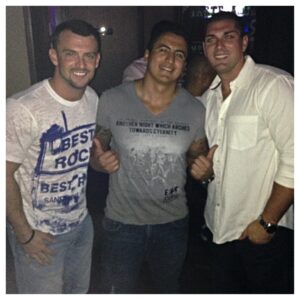
Every journey begins with the first step. For Ron, his first steps were in Coral Springs, Florida, where he grew up with his mom, dad and older sister. Ron’s parents still reside there and his sister moved back from New York to Florida during COVID.
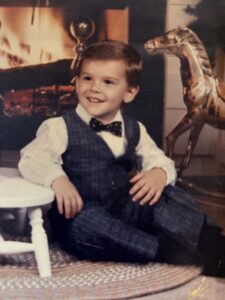
“My parents are great,” says Ron. “Dad was a Florida Highway Patrolman for 35 years, so he was in law enforcement, retired in 2018, and now he just tries to play golf without hurting himself. And then my mom worked in two industries. She was in the banking industry. And then, believe it or not, she was in insurance. She worked for Allstate and she’s also retired as well. They live in Coral Springs still to this day. My sister works for a marketing and advertising firm, and her husband is a CPA. So it’s good. They both have great careers. They both do well for themselves and they have two great kids.”
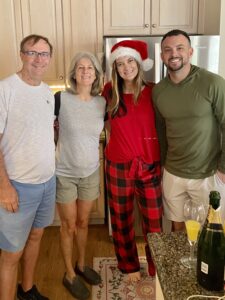
Family matters and back in college Ron met the woman who would help him create his other family, his wife, Danielle. For Ron, it was an education in quick maturity.

“I started dating Danielle, the woman who would become my wife, when I was in high school, she was a year older than me. So I was the cool guy dating a college woman when I was still a senior in high school, so it was a pretty easy decision to make a move up to Orlando to be closer to her. Then I walked on and played a couple years of baseball at Seminole State. But I didn’t make the final cut in my third year, and I had one more year of eligibility, so I could have chosen to go somewhere else and try to play a fourth year, but I was realistic with myself. Obviously it’s pretty upsetting. You play baseball your whole life and you picture it as you go through school. You’re not thinking a communications degree is going to be your future. You’re just saying, “Hey, I’m doing school to stay eligible so I can continue to play baseball because I’m going to be a professional,” but it’s not how it worked out. It’s not easy to make it to the pros. So, after three years, I just decided, “Hey, I need to go start making money.” I could have done another year, but I was more realistic about it.”
“I graduated from UCF with a degree in communications. Then after a stint as a valet, I pretty much went right into commission sales, first at LA Fitness with a bunch of the guys I work with now, then USHEALTH Advisors. So you get a degree, some student loan debt, and then you go into sales to make life really happen.”
When it came to sales, Ron says he put a great amount of trust in his friend Johan.
“It was Johan who persuaded me to come to LA Fitness and sell gym memberships. And five years later, he eventually persuaded me and I trusted Johan, to join him again at USHA and check out insurance sales.”
The transition worked and now, Ron is persuading others to follow him in his career path. He will tell you there are no secrets or shortcuts to success. It all works if you work and Ron’s life experiences, like so many other people, set him up for success, and he shares those with his new agents.
You are always most qualified to help the person you used to be.
“It’s three things,” says Ron. “You have to be driven. You have to have a general idea as to why you want to come do this. Because you didn’t wake up saying, “Man, you know what? I want to go follow my dream of being an insurance professional.” That’s not how it goes. So you have to have a general reason. And again, I tell people it’s not criminal to be motivated by money. It is not as long as you come into it with pure intentions. Because most of the people that we bring in, they’re kind of broken, maybe financially, maybe personally, or both. They’re just trying to find their footing in an industry where they can earn some money, work with good people and build a career. So I say you have to be driven, right? Success has to matter for you in some way, shape, or form.”
“I say number two, you have to be ethical, so you have to come into this with the right reasons in your heart. And number three is you have to be coachable. You have to be willing to completely strip yourself of all types of ego. Not saying, “Oh, I already know this, or I know that,” because depending on what your experience is you have to let us teach you how to do the job. So I think those are the three things. You have to have good character and be ethical. You’ve got to be driven, and you’ve got to be coachable. You’ve got to be willing to learn.”
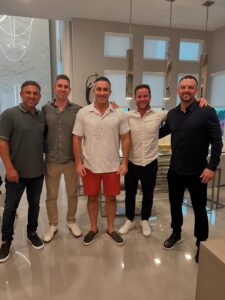
During this journey Ron has also learned to appreciate what is most important. Ask him what his greatest accomplishment is and he doesn’t hesitate.
“My greatest accomplishment in my life – starting a family and having my daughter, Vale, then having the pressure and the blessing of being viewed as a good father. I think that’s super important. Having my daughter is my biggest accomplishment, and just being there for my family as a whole.”

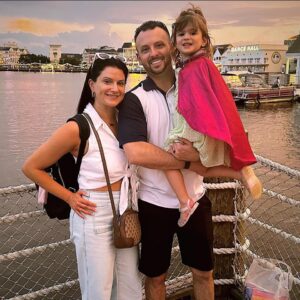
Ron continues, “Which also leads to my greatest challenge: balancing everything. At the end of the day, we’ve got a lot of work to do here at USHA. We have a huge responsibility for this, and we all know this takes up a lot of our time and a lot of our mental energy. And then at the same time, you’ve got to make sure that you’re being a good husband and father as well. It’s definitely a juggling act. You always feel like in one of those areas you could be doing more. And I think that’s always the thing in life. I talk to Johan a lot. I talk to Chris a lot, I talk to Kevin and Ryan and other leaders and we always feel like we could be doing more. Maybe it’s that saying, only the paranoid survive. I don’t know, for better or worse, I don’t know if that’s a good mindset to live with, but you’re just always trying to make sure you’re doing the most for all the buckets you have to fill. So I would say my biggest accomplishment is my family in particular, having my daughter. And then my biggest challenge has been making sure that it’s all balanced and everybody is happy and people are taken care of.”
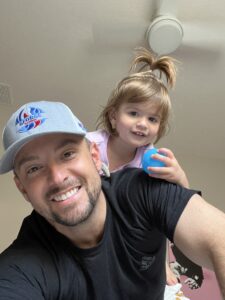
Ron says, “It’s what our and USHA President and CEO Troy McQuagge explains, “At the end of the day, how much you earn here should be in direct proportion to your level of care.”
“I think as human beings, it is our job to treat people well. I think it’s the saying, someone may forget what you say, but they’ll never forget how you made them feel. So I think it’s our duty and responsibility to treat others well. And it’s the whole – how do you want to be remembered type of thing. You don’t really think about it too much. But someone asked me this a few months back and they said, “Start thinking about your funeral.” That’s weird to think about, but it’s like, who would show up to my funeral? How many people? And what if they all had to say something? Would they all be saying the same general thing? I hope that they would throw words around like he was a good person, he showed great character, he always made me feel appreciated or good about what I’m doing.”
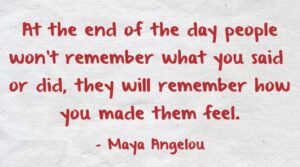
“And I don’t know, sometimes we have to have tough conversations with people here. And if you can have a really tough conversation with somebody and you can tell them something that they probably don’t want to hear, but they still leave the room loving you as a person and not thinking they just got beat down, I think that’s a really important skill to try to cultivate. We’re all still working at it, right? But yeah, I would say if there’s one thing, it’s how you make others feel that is super important to me. And so that’s what I’ve always tried to do, I’ve always tried to make people feel like they matter.”
Ron is preaching to the choir. Everyone Matters. You Matter. 😉
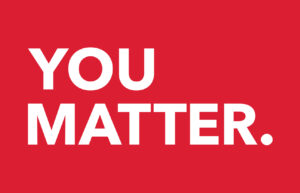
Until next time, thanks for taking the time.
Your Storyteller,
Mark Brodinsky
